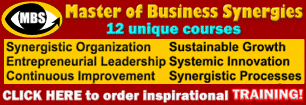|
by
Vadim
Kotelnikov, Founder,
Ten3 Business e-Coach,
1000ventures.com
"Nothing great was ever
achieved without enthusiasm."
-
Ralph Waldo Emerson
|
Outstanding Performers:
Three
Self-Motivational Competencies |
-
Achievement Drive: Striving to improve
or meet a standard of excellence.
-
Commitment: Embracing the organization's
or groups vision and goals.
-
Initiative and Optimism: Twin
competencies that mobilize people to seize opportunities and allow them to
take setbacks and obstacles in stride.
|
|
NLP Technology of Achievement
Rules of Self-motivation |
-
Motivation is not a product of external influence; it is a natural product
of your desire to achieve something and your belief that you are capable to
do it
-
Positive pleasure-oriented goals are much more powerful motivators than
negative fear-based ones. The right combination of both is the most powerful
motivating mix.
-
Start with visualizing clearly your future success and model the feelings
you'll experience when you achieve it
-
Walk mentally the path towards this success and model your feelings at
different milestones on the way
-
Assign a high priority to the task
|
|
Self-motivation Techniques |
-
Set a target for the amount of work you
will do each day
-
Visualize the desired outcome: Create a
picture of what the desired outcome will look like, and have this vision
before you
-
Set milestones of the things you like to
do and are proficient in
-
Use visual indicators to monitor
progress and complete the task
|
|
Emotional Intelligence
(IQ)
"Emotional Intelligence"
refers to your capacity to recognize your own feelings and those of others,
for motivating yourself, and for managing
emotions well in yourself and in your relationships. "It describes abilities
distinct from, but complementary to, academic intelligence, the purely
cognitive capabilities measured by IQ. Many people who are book smart lack
emotional intelligence but lack emotional intelligence end up working for
people who have lower IQs than they but who excel in emotional intelligence
skills."1...More


|
Bibliography:
-
"Emotional Intelligence", Daniel Goleman, 1995
-
"Working with Emotional Intelligence", Daniel Goleman, 1998
-
"Getting Things Done", Francis Lobo, 2003
|



